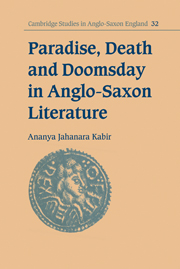Book contents
- Frontmatter
- Contents
- Preface
- List of abbreviations
- 1 Between Eden and Jerusalem, death and Doomsday: locating the interim paradise
- 2 Assertions and denials: paradise and the interim, from the Visio Sancti Pauli to Ælfric
- 3 Old hierarchies in new guise: vernacular reinterpretations of the interim paradise
- 4 Description and compromise: Bede, Boniface and the interim paradise
- 5 Private hopes, public claims? Paradisus and sinus Abrahae in prayer and liturgy
- 6 Doctrinal work, descriptive play: the interim paradise and Old English poetry
- 7 From a heavenly to an earthly interim paradise: toward a tripartite otherworld
- Select bibliography
- Index
1 - Between Eden and Jerusalem, death and Doomsday: locating the interim paradise
Published online by Cambridge University Press: 19 October 2009
- Frontmatter
- Contents
- Preface
- List of abbreviations
- 1 Between Eden and Jerusalem, death and Doomsday: locating the interim paradise
- 2 Assertions and denials: paradise and the interim, from the Visio Sancti Pauli to Ælfric
- 3 Old hierarchies in new guise: vernacular reinterpretations of the interim paradise
- 4 Description and compromise: Bede, Boniface and the interim paradise
- 5 Private hopes, public claims? Paradisus and sinus Abrahae in prayer and liturgy
- 6 Doctrinal work, descriptive play: the interim paradise and Old English poetry
- 7 From a heavenly to an earthly interim paradise: toward a tripartite otherworld
- Select bibliography
- Index
Summary
If it is permissible to define literature, with a certain rhetorical flourish, as a mirror of society, it is nevertheless a more or less distorting mirror depending on the conscious or unconscious desires of the collective soul which is examining itself – depending, more particularly, on the interests, prejudices, sensibilities and neuroses of the social groups responsible for making the mirror and holding it up to society, or at least that part of society capable of seeing, that is, of reading. Fortunately, the mirror is also tendered to us as members of a posterity better equipped to observe and interpret the interplay of illusions.
This book is about what I term the ‘interim paradise’, reflected in the mirrors of Anglo-Saxon literature. Its subject is the rarely noted conjunction of two much-discussed concepts: paradise, and the soul's condition in the interim period between death and Judgement Day. It also involves a methodological conjunction: the use of the techniques of literary analysis and source-study to trace the history of an idea in Anglo-Saxon England, and to understand, through that history, some of the processes of production and consumption of literature in this period.
Today, the interim period between death and Judgement Day is most commonly associated with the concept of purgatory, even as the word paradise evokes either the Garden of Eden, or a heavenly state of bliss after death.
- Type
- Chapter
- Information
- Publisher: Cambridge University PressPrint publication year: 2001



